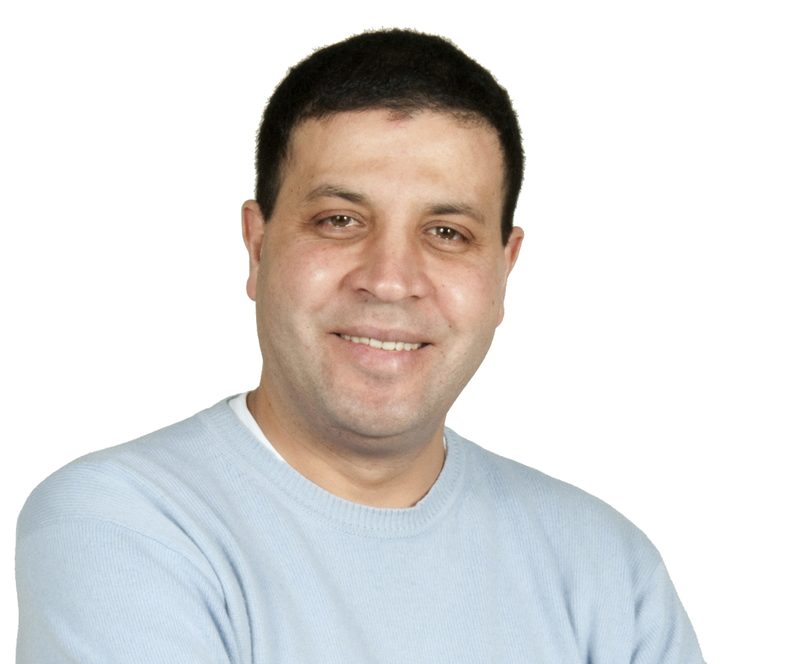
Full professor
Affiliation
Université de Montréal
Research Axes
Team
- Diana Adjaoud, lab manager
- Oumaima Ahmed, research associate
- Ali Boubacar Kalidou, PhD Student
- Moustafa Khalil, PhD Student
- Louis Masclef, research associate
- Clémence Messmer, PhD Student
- Mila Gushul-Leclaire, Intern
- Nay Bashou, Intern
El Bachir Affar, Ph.D., in physiology-endocrinology, is the director of the Cellular Signaling and Cancer Research Unit at Maisonneuve-Rosemont Hospital. He is also a full professor in the Department of Medicine and an accredited professor in the Department of Biochemistry and Molecular Medicine at the Université de Montréal.
Dr. Affar's research interests include cell signaling via ubiquitination, DNA and chromatin related processes (transcription and DNA repair), and the molecular basis of cancer. His team is particularly interested in the BAP1 gene, a gene that is frequently mutated in certain types of cancers.
Research Unit
Cellular Signalling and Cancer
Ubiquitination is a post-translational modification that plays a key role in the regulation of several cellular functions. From a clinical point of view, mutations in many genes of the ubiquitin system have been causally linked to various diseases, including cancer. Ubiquitination is a reversible process due to the presence of deubiquitinases (enzymes that specifically remove ubiquitin from target proteins). Although little is known about deubiquitinases, they are emerging as central regulators of the ubiquitin system.
Our goal is to characterize the biological functions and mechanisms of action of deubiquitinases involved in transcription and DNA repair, two processes whose deregulation plays a fundamental role in cancer development.
We use state-of-the-art biochemical, molecular biological and cell culture approaches to characterize the functions of deubiquitinases.
Our work allows a better understanding of the molecular mechanisms governing the ubiquitin system. In addition, new concepts will be developed concerning the regulation of transcription and DNA repair. Furthermore, our work should contribute to the identification of new therapeutic targets for the treatment of cancer in personalized medicine.
Publications
Voir toutes les publications-
Uriarte M, Sen Nkwe N, Tremblay R, Ahmed O, Messmer C, Mashtalir N, Barbour H, Masclef L, Voide M, Viallard C, Daou S, Abdelhadi D, Ronato D, Paydar M, Darracq A, Boulay K, Desjardins-Lecavalier N, Sapieha P, Masson JY, Sergeev M, Kwok BH, Hulea L, Mallette FA, Milot E, Larrivée B, Wurtele H, Affar EB. Starvation-induced proteasome assemblies in the nucleus link amino acid supply to apoptosis. Nat Commun. 2021 Nov 30;12(1):6984. doi: 10.1038/s41467-021-27306-4.
More detail -
Barbour H, Daou S, Hendzel M, Affar EB. Polycomb group-mediated histone H2A monoubiquitination in epigenome regulation and nuclear processes. Nat Commun. 2020 Nov 23;11(1):5947. doi: 10.1038/s41467-020-19722-9.
More detail -
Masclef L, Ahmed O, Estavoyer B, Larrivée B, Labrecque N, Nijnik A, Affar EB. Roles and mechanisms of BAP1 deubiquitinase in tumor suppression. Cell Death Differ. 2021 Feb;28(2):606-625. doi: 10.1038/s41418-020-00709-4. Epub 2021 Jan 18.
More detail -
Daou S, Barbour H, Ahmed O, Masclef L, Baril C, Sen Nkwe N, Tchelougou D, Uriarte M, Bonneil E, Ceccarelli D, Mashtalir N, Tanji M, Masson JY, Thibault P, Sicheri F, Yang H, Carbone M, Therrien M, Affar EB. Monoubiquitination of ASXLs controls the deubiquitinase activity of the tumor suppressor BAP1. Nat Commun. 2018 Oct 22;9(1):4385. doi: 10.1038/s41467-018-06854-2.
More detail -
Uriarte M, Milot E, Affar EB. USP42 deubiquitinase in the arena of liquid-liquid phase separation and nuclear speckles. Cell Death Differ. 2021 Jun;28(6):2022-2024. doi: 10.1038/s41418-021-00794-z. Epub 2021 May 10.
More detail -
Sen Nkwe N, Daou S, Uriarte M, Gagnon J, Iannantuono NV, Barbour H, Yu H, Masclef L, Fernández E, Zamorano Cuervo N, Mashtalir N, Binan L, Sergeev M, Bélanger F, Drobetsky E, Milot E, Wurtele H, Costantino S, Affar EB. A potent nuclear export mechanism imposes USP16 cytoplasmic localization during interphase. J Cell Sci. 2020 Feb 24;133(4):jcs239236.
More detail -
Affar EB, Carbone M. BAP1 regulates different mechanisms of cell death. Cell Death Dis. 2018 Nov 19;9(12):1151. doi: 10.1038/s41419-018-1206-5.
More detail -
Bononi A, Giorgi C, Patergnani S, Larson D, Verbruggen K, Tanji M, Pellegrini L, Signorato V, Olivetto F, Pastorino S, Nasu M, Napolitano A, Gaudino G, Morris P, Sakamoto G, Ferris LK, Danese A, Raimondi A, Tacchetti C, Kuchay S, Pass HI, Affar EB, Yang H, Pinton P, Carbone M. BAP1 regulates IP3R3-mediated Ca2+ flux to mitochondria suppressing cell transformation. Nature. 2017 Jun 22;546(7659):549-553.
-
Mashtalir N, Daou S, Barbour H, Sen NN, Gagnon J, Hammond-Martel I, Dar HH, Therrien M, Affar el B. Autodeubiquitination protects the tumor suppressor BAP1 from cytoplasmic sequestration mediated by the atypical ubiquitin ligase UBE2O. Mol Cell. 2014 May 8;54(3):392-406.
-
Daou S, Hammond-Martel I, Mashtalir N, Barbour H, Gagnon J, Iannantuono NV, Nkwe NS, Motorina A, Pak H, Yu H, Wurtele H, Milot E, Mallette FA, Carbone M, Affar el B. The BAP1/ASXL2 Histone H2A Deubiquitinase Complex Regulates Cell Proliferation and Is Disrupted in Cancer. J Biol Chem. 2015 Nov 27;290(48):28643-63.
-
Gagnon J, Daou S, Zamorano N, Iannantuono NV, Hammond-Martel I, Mashtalir N, Bonneil E, Wurtele H, Thibault P, Affar el B. Undetectable histone O-GlcNAcylation in mammalian cells. Epigenetics. 2015;10(8):677-91.
-
Yu H, Pak H, Hammond-Martel I, Ghram M, Rodrigue A, Daou S, Barbour H, Corbeil L, Hébert J, Drobetsky E, Masson JY, Di Noia JM, Affar El B. Tumor suppressor and deubiquitinase BAP1 promotes DNA double-strand break repair. Proc Natl Acad Sci U S A. 2014 Jan 7;111(1):285-90.
Education
Postdoctoral fellowship
Department of Pathology, Harvard Medical School, Boston
Postdoctoral fellowship
Skin Cancer Research Laboratory, Laval University Hospital Center (CHUL), Québec
PhD in physiology and endocrinology
Laval University Hospital Center (CHUL), Québec
Awards
- 2016 Senior Research Scholar (FRSQ)
- 2011 New Investigator Award (IRSC)
- 2011 Junior 2 Research Scholar (FRSQ)
- 2011 Maud Menten New Principal Investigator Finalist Award (Institute of Genetics, CIHR)
- 2007 Junior 1 Research Scholar (FRSQ)
- 2001 Taplin Postdoctoral Fellowship (Harvard University, Boston)
- 1999 Dean’s Honour List – PhD (Laval University, Québec)
- 1991 Award of excellence for graduate studies (Ministry of National Education, Morocco)
